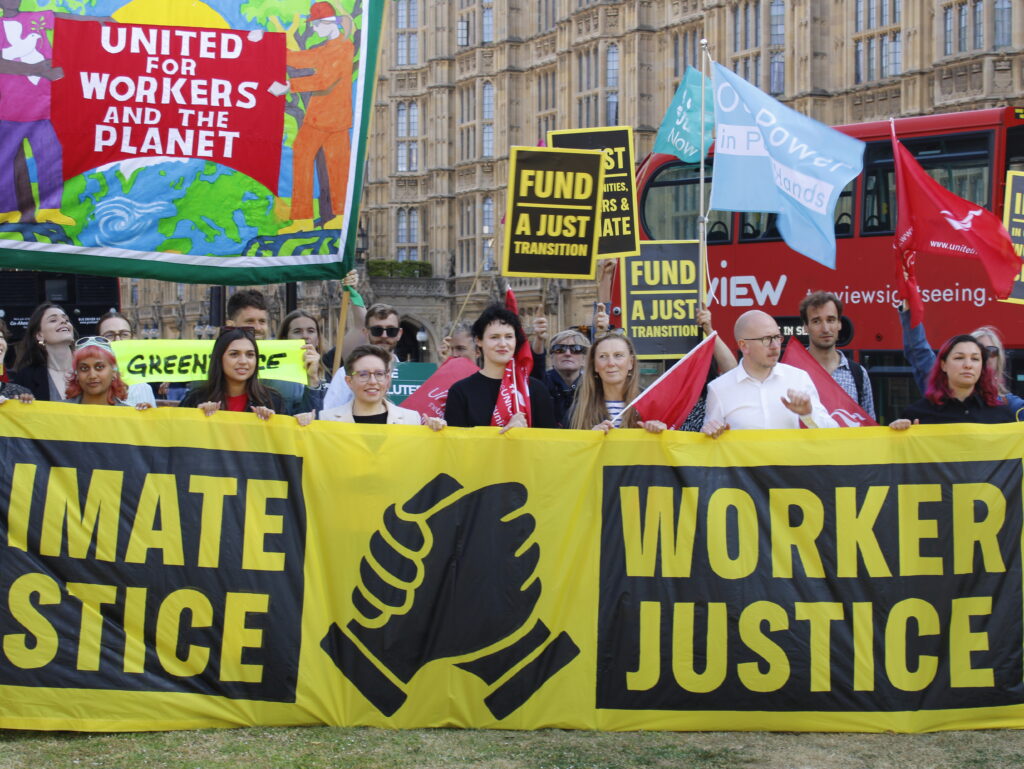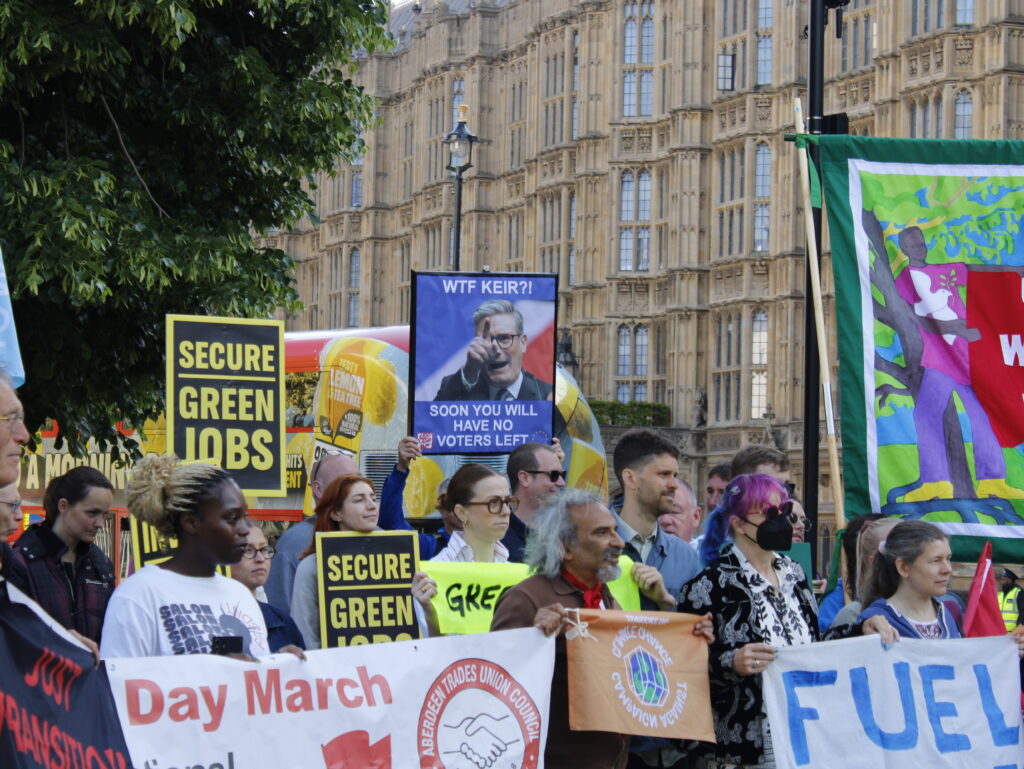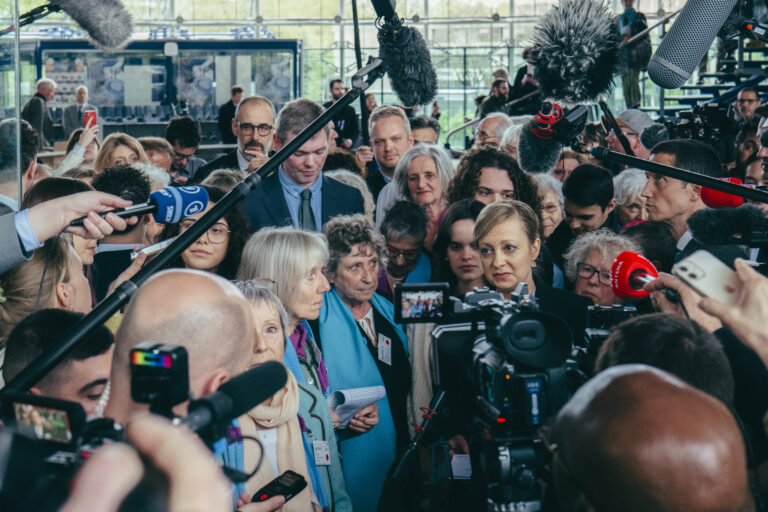Just south of the Houses of Parliament in London, Chris Hamilton stood before an unlikely crowd of oil industry employees and green activists. “Up until last week, I would have introduced myself as a worker at Grangemouth,” said the Unite union convenor from the recently closed oil refinery site in Scotland.
“Today, oil and gas workers are heading towards a cliff edge. This is the opposite of what politicians have been promising.”
Organised by Greenpeace, the rally urged the Treasury to provide a £1.9bn emergency package to workers in the North Sea, where 30,000 jobs could be lost to the renewable energy transition. This protest may point to an uncomfortable truth for Labour – its net zero policy might be edging voters closer to parties on both the left and the far right.

Though angry with the government’s failure to protect workers’s interests, most of the speakers referenced a more ominous political threat: the growing popularity of Reform UK, the self-titled “main opposition party”.
After becoming the country’s third most popular party at the 2024 election and its sweeping success in English local council elections, Reform is on an upwards trajectory. Founded by the former UKIP party leader and avid Brexiteer, Nigel Farage, the party has found success with those on the far right. Their target was initially those who may have voted Conservative in the past, and are opposed to immigration and welfare spending.
Now the party seeks to widen its pool of voters by harnessing other narratives enjoyed by far-right politicians around the world – most notably climate denialism.
Reform deputy leader Richard Tice has openly called man-made climate change “garbage” in interviews this year. The MP for Boston and Skegness has since announced that the party intends to block renewable energy projects in areas where it won local council elections. Reform also pledges to reinvest in North Sea oil and gas operations if they win the 2029 general election.
Such policies set the party’s sights firmly on Scotland, seeking to make gains from both the Scottish National Party and Labour in upcoming parliamentary elections.
Gerry Hassan, writer and professor of social change at Glasgow Caledonian University, said “there is a chasm to be addressed” in Scottish politics.
“Simple messages will cut through to voters. Labour doesn’t have a set of stories about Britain, but Reform has a story – and that story has resonance.”
In Grangemouth, the closure of the oil refinery was symbolic of a failure to protect working people. “Grangemouth is an issue that will haunt both [Westminster and Scottish] governments for a while,” Hamilton says.
“Many people in this town will struggle to vote for Labour again,” he adds. “Reform is more pragmatic on oil and gas.”

Hamilton had been campaigning since 2023 to keep Grangemouth open. He says the site could have been “future-proofed” and workers retrained in the renewables sector, but no one was interested in investing in such changes. “There hasn’t been a just transition – there’s been no transition,” he says.
The shortcomings of Labour, and past Conservative governments present a great opportunity for Reform, says John Moloney, assistant general secretary for the Public and Commercial Services (PCS) union. He expresses concerns about their potential replacement’s intentions, though: “Reform know who to target.”
“They have a strong rhetoric and slogans, but it’s false promises for workers,” Moloney adds. “People in de-industrialising towns need support. Reform only sees [them as] an opportunity.”
As a new party with only six seats in Westminster, Reform is yet to prove whether it will protect worker’s interests in practice.
I think you need to follow the money with Reform
Carla Denyer, Green Party co-leader
The party does have a track record of close relationships with the fossil fuel sector. Reform took £2.3m in donations from oil and gas companies and climate deniers from 2019 to 2024, as reported by climate news and investigations outlet DeSmog.
“I think you need to follow the money with Reform,” says Green Party co-leader Carla Denyer.
“When you see who has made donations to the party, you can see where these messages are coming from.”
Denyer remains hopeful that the party will not be sticking around. “It’s very worrying, but I think they may be a flash in the pan … I think when voters see Reform, their policies, and how they deal with local councils, they will not want to keep them in.”
Her party has also benefited from the falling popularity of Britain’s dominant parties, gaining local council seats from both parties in recent elections. Now as a key player on the left, Denyer hopes that by backing workers’ rights and the “just transition” to renewable energy, voters will have another option that isn’t Labour or Reform.
“The Green Party has the solutions,” Denyer says. “We know how to run local councils and care about people’s interests.”
The rise of smaller parties in the past five years puts the Labour government in a new bind facing attacks from all sides of the political spectrum. While remaining committed to net zero targets, Sir Keir Starmer faces a problem if his party loses their most loyal voters.
Where they go remains to be seen.




